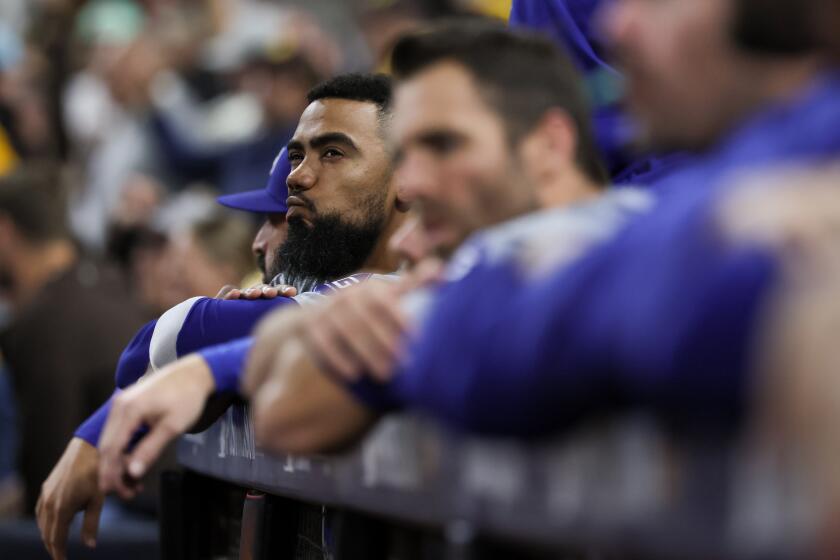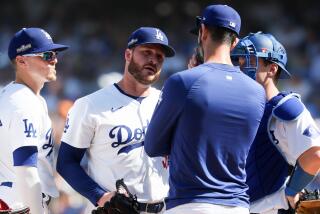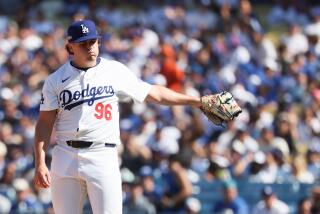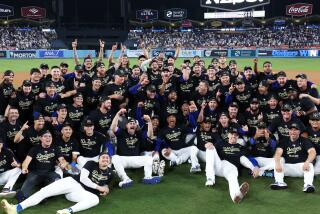
- Share via
SAN DIEGO — In the run-up to this week’s National League Division Series, it was the quietest player on the Dodgers roster who delivered the most profound speech.
This series, soft-spoken veteran Chris Taylor told his teammates in a hitters meeting before Game 1 on Saturday, would be all about intensity.
“Every time we play these guys,” Taylor said of the San Diego Padres, “they always have high intensity and a lot of energy.” So, he implored the club, “We need to match that.”
Three games in, it had not happened.
Following a 48-hour news cycle in which the emotional scales of this series shifted dramatically — beginning when Dodgers fans hurled baseballs and beer bottles at the Padres during their Game 2 win, then escalating amid the fallout of Manny Machado’s throw at the Dodgers dugout that same night — the Padres won Game 3 of the series 6-5 on Tuesday night.
The Dodgers’ lack of fury and energy in their loss to the San Diego Padres in Game 3 of the NLDS has the team back on the brink of another broken October.
And they did so by out-executing the Dodgers in the game’s defining second-inning sequence.
“We can’t look at the mountain,” outfielder Mookie Betts said after the Dodgers moved within one loss of adding another NLDS elimination to their recent postseason failures. “We have to just look at the task at hand, and that’s one pitch at a time.”
“They’re going to be trying to eliminate us tomorrow,” catcher Will Smith added. “So we have to go out there and fight.”
The Dodgers did so early in Tuesday’s game, when Betts snapped his two-year-old, 0-for-23 hitless streak in the playoffs by lifting a solo home run to left in the first inning — a drive that narrowly avoided being robbed by Jurickson Profar for a second straight game.
But even with an early lead — a rarity for the Dodgers in recent Octobers — they couldn’t sustain momentum. Instead, the advantage evaporated in a six-run, second-inning collapse.

The meltdown started in ominous fashion, with starting pitcher Walker Buehler being assessed a pitch-clock violation and automatic ball after struggling to hear his PitchCom device amid deafening chants of “Man-ny!” for Machado at the plate.
Then, after Machado capitalized on the count leverage by rolling a 2-and-1 single through the infield, the 13-year veteran made a wise (albeit controversial) play on the bases to change the trajectory of the game.
On a potential double-play grounder off the bat of Jackson Merrill, first baseman Freddie Freeman dove for the ball and delivered an on-target throw to second from his knees. Machado, however, had positioned himself between Freeman and the base, having looked over his shoulder to see where Freeman fielded the grounder and then altering his route onto the infield grass.
Instead of a possible double play, Freeman’s throw glanced off Machado’s helmet and ricocheted into center field. And even though Machado had veered his path, it wasn’t enough to warrant an interference call from the umpires.

“It’s not a replayable challenge play,” Dodgers manager Dave Roberts said, noting that because it wasn’t a tag play, Machado was allowed to create his “own basepath.”
“It was a heady play,” Roberts added.
Some Dodgers felt more strongly, with both Buehler and shortstop Miguel Rojas arguing the umpires should have ruled for interference (even though, as Freeman noted, Machado’s move is what baserunners are taught to do in such situations).
“I mean, both feet are on the grass,” Buehler said. “But I’m not an umpire.”
“I was talking to the umpire,” Rojas added, “but he told me that he wasn’t looking at the runner. He was looking at the play at second base.”
Questionable call or not, it was the kind of high-pressure execution that often can decide playoff games — a consequential, split-second decision that Rojas failed to match on the following play.
When Buehler induced another grounder from Xander Bogaerts in the next at-bat, Rojas fielded the ball and had two choices: flip to second baseman Gavin Lux to get at least one out, or shuffle to the bag and try to turn two himself.
Despite playing with an adductor strain that has limited his mobility in recent weeks, Rojas attempted the latter. Merrill, however, slid into second before he got there. Then, Bogaerts outlegged the throw to first, leaving everyone safe as Machado crossed the plate to tie the score.

“I felt like the best way for us to get two outs there was that,” said Rojas, who aggravated his injury on the play, forcing him to leave the game the following inning. “But getting one out there probably was the best option, and I made a bad decision.”
It was the nightmare scenario Roberts had warned of earlier in the day, while trying to counter all the talk of emotions and intensity by saying “the most important thing is playing good baseball.”
And it resulted in the kind of inning that has doomed this team so often in recent Octobers, the Dodgers failing to stem the tide until they’re too far under water and allowing mistakes to spiral.
“We gave them a big inning,” Smith said. “We can’t let that happen.”
After Rojas’ botched double play, the Padres began to feast on Buehler, who missed chances to limit the damage by giving up three crucial two-strike hits.

The first, a double by David Peralta, scored two runs. The next, an infield single by Jake Cronenworth, set up a sacrifice fly. The third, on an 0-and-2 heater down the middle to Fernando Tatis Jr., did irreparable harm: a two-run, second-deck home run to left field that ballooned the Padres’ lead to 6-1.
“There was a bunch of mayhem and then I made a bad 0-2 pitch, and he kind of does what he does,” Buehler said. “You can’t give up six runs in an inning of the playoffs and expect to win.”
The Dodgers still tried, taking a big bite out of the Padres’ lead on Teoscar Hernández’s grand slam in the third inning to make it 6-5. Buehler, meanwhile, settled down to get through the fifth inning before handing things off to the bullpen.

However, the Dodgers made 16 straight outs after Hernández’s slam, stranded their lone late baserunner in the eighth, then went down with a whimper in a 1-2-3 ninth, wilting offensively in the face of four dominant Padres relievers — including Tanner Scott, who struck out Shohei Ohtani for a third straight game — and 47,744 raucous fans sensing a potential Game 4 elimination.
“We hit back, just not hard enough,” said Smith, who headed into Game 4 with four walks but no hits in the series.
“We just have to win two games in a row,” Ohtani said through his interpreter, optimistic despite heading into Game 4 just two for his last 11 with six strikeouts since his home run in the opener. “I don’t really have the sense of there being no tomorrow. We win two games and we’re OK.”
Sounds simple, until you remember the Dodgers’ checkered postseason history — and their precarious situation.

While the Padres turned to Game 1 starter Dylan Cease on short rest Wednesday, the Dodgers went with a bullpen game, trying to mix and match their way to nine innings from a group that has been overtaxed all season.
The status of Rojas and Freeman, who continued to limp around the diamond on a sprained right ankle, also were up in the air, with each looking likely to be a game-time decision.
And, worst of all, the intensity gap that Taylor highlighted before the series still seems to exist.
In the most critical moments, the even-keeled Dodgers have cracked under the pressure — allowing the brash, brazen Padres to put their season on the brink.

More to Read
Are you a true-blue fan?
Get our Dodgers Dugout newsletter for insights, news and much more.
You may occasionally receive promotional content from the Los Angeles Times.











